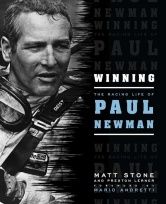 Winning – The Racing Life of Paul Newman. Click image to enlarge |
By Russell Purcell
“If I hadn’t been an actor, or a director of film, I guess I would have liked to become a racing driver more than anything else.” – Paul Leonard Newman
A book about Paul Newman seems like an odd choice for author Matt Stone to tackle, as the acclaimed writer usually scribbles about four-wheeled subject matter. But in a sense, that’s what makes this book stand apart from the others dedicated to the life of the Academy Award winning actor and unparalleled philanthropist.
Winning – The Racing Life of Paul Newman derives its title from the 1968 movie Winning in which Paul portrayed Frank Capua, a struggling racing driver looking for victory at the Indianapolis 500. It was Paul’s involvement with this film that supercharged his interest in motor sports; during production Paul learned how to race and got to sample three different disciplines of the sport: road racing behind the wheel of a Can-Am monster; stock car racing in a cumbersome NASCAR sedan; and of course, Indy Cars at Indianapolis.
The book’s Forward was written by his friend of over 40 years and business partner, American racing legend Mario Andretti. Mario was the man responsible for putting Paul and Chicago-based businessman Carl Haas together to form what would become one of the best run and most successful top-tier Indy Car operations to ever grace a paddock.
The reader gains great insight into the “real” Paul Newman through Mario’s heartfelt writing. “He was a really colourful character, bigger than life but also trying to be extraordinarily ordinary; wanting to be just one of the guys.” Mario proclaims that Paul “took to racing like cream cheese on a bagel, and that he “was always impressed by his depth of technical comprehension.” “He had a love affair with race cars.”
Paul quickly rose from the ranks of amateur sports car competition to establish an impressive professional racing resume which includes everything from top-speed runs at Bonneville and play-dates in sprint cars, to glory on the world stage at Le Mans and Daytona. After reading this book you will no doubt be amazed at the breadth of Newman’s racing experience and surprised at how many victories he amassed during his secondary career.
Racing and tinkering with automobiles allowed the esteemed actor “to keep his feet on the ground,” and Paul once said that “Racing is the best way I know to get away from the rubbish of Hollywood.”
Legendary race instructor Bob Bondurant says that Paul had “not only the desire, but also the talent.” Unfortunately Paul had to put off serious involvement due to “studio disappointment” and a respect for the fact that he started honing his skills rather late in life (45).
A lot of rich guys race, but most carry their talent in their wallets. Paul Newman, on the other hand, was the real deal behind the wheel, and was a much more accomplished racing driver than people give him credit for. In fact, Paul competed in the 24 Hours of Daytona (1979 – Porsche 935), 12 Hours of Sebring, and even the 24 Hours of Le Mans (1979). In the latter event the Dick Barbour-run 935 took an unexpected second place at the storied French classic, which represented a class win, but the team’s phenomenal success was not enough to entice Newman to return for another attempt, due to the excessive pressure put upon him by both fans and media.
Paul found most of his success behind the wheel of Nissan-based (Datsun) race cars as part of the Bob Sharp Racing stable. In 1978 Paul stood atop the podium in 12 of 15 races (behind the wheel of a 280Z and a 200SX) and started from the pole position at eight of those events. The following year he won 14 of 16 events!
Advertisements for sponsors like Budweiser, Pioneer Car Stereo and Maxwell House Coffee would reveal Paul’s racing sideline to consumers all over the world.
It is said that Newman was more than willing to race anything with wheels. Racing driver and motor sport commentator Sam Posey put it best when he said that Paul “acted his way into being a racing driver. He used his powers of concentration and his image of himself succeeding, and he played it like a role.”







 Follow Autos on Twitter
Follow Autos on Twitter



